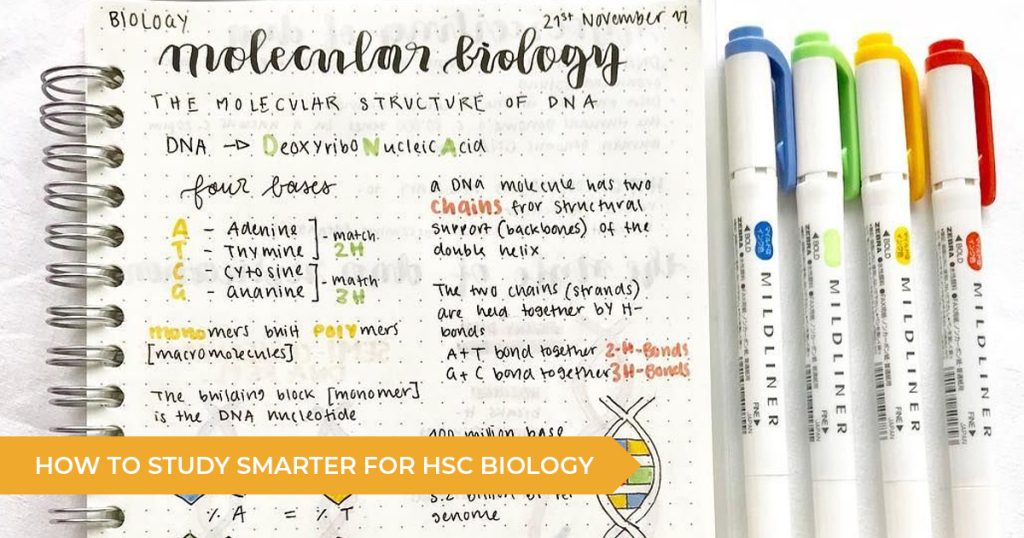Biology study tips that actually work

Studying for Biology is often quite different to studying the other sciences, such as Chemistry or Physics, as there is so much content to learn.
However, the fundamentals of sticking to the syllabus and doing past papers remain the same.
Syllabus
Following the NESA Biology syllabus is the key to determining what is or isn’t high yield. While it’s crucial to know all the content outlined in the syllabus, a common mistake take students make, especially in Biology, is going far beyond the syllabus requirements.
Sometimes, this can be useful, particularly when contextualising a specific concept, for example, understanding more than just one example of adaptation.
However, it becomes detrimental when students try too hard to memorise content beyond the syllabus, especially if it’s at the sacrifice of syllabus content.
Memorisation
Biology is realistically, one of those subjects where more memorisation is required. There are a lot of facts and processes that just have to be rote learned. But this doesn’t mean it has to be a chore to do. There are many techniques in how to approach memorising content.
Two scientifically proven core concepts to memorising content are active recall and spaced repetition. Active recall is the practice of using effort to remember information. Notably, this is done through past papers (discussed later on) or practising questions via flashcards.
Passive methods include taking notes, highlighting, or reading textbooks, common methods students use that don’t really work. Active methods are always better as they force your brain to recall information, whereas information is simply fed to you in passive methods.
Spaced repetition is the concept that you need to continually practice and be exposed to the same concept in order to memorise it. Students often will only be exposed to content 2-3 times, usually the first time they learn it, and when cramming before exams. While this does work for some students, it’s best to go over content multiple times. This can be done via weekly homework, practice questions, or by consistently doing past papers.
Note-taking methods
Note-taking is a big part of learning biology, as there is a lot of content to cover in the syllabus. How you take notes is dependent on how you learn, and therefore there is no ‘one size fits all’ rule.
RELATED: The Ultimate Guide To High School Biology (HSC & Preliminary Modules 1 – 8)
Some students may find it useful to take detailed notes as they study during Biology, then revise and memorise their notes before exams. Alternatively, some students find that making a set of concise notes before exams can help with memorisation, as well as picking out higher yield content. This is good if you find that you are able to remember the majority of content as you learn, and just need to rote learn a little towards the end.
However, for many students, it often feels like there’s an overwhelming amount of content to cover throughout the course, and especially before exams. The first advice for this, as mentioned before, is to NOT try and learn everything! Pick high yield syllabus content to memorise first, then add more details in later if you have time. Spaced repetition also helps in this case, by spreading the amount of memorisation across the year. Some students find that using physical or digital flashcards, such as Anki, help in this process.
Practice Papers
Doing practice papers is the most important step that students can take to improving their biology study. These papers emulate exam conditions, provide opportunities for active recall, and help you understand what content is or isn’t high yield.
Even if you haven’t taken notes or practiced active recall and spaced repetition throughout the year, doing past papers right before exams will still help significantly before your exams. It may be hard to find HSC papers, due to the new syllabus, but many schools will have their Biology Trial Exams and Half-Yearly Exams available.
Here at Talent 100, each module is followed by a practice exam, with HSC mock exam classes in the school holidays as well, making these crucial opportunities to improve your Biology results.
Need some extra help? We’ve got you covered at Talent 100
Our Sydney learning centres are open all week (Burwood, Chatswood, Epping, Hurstville & Sydney CBD), so you can brush-up on your Biology skills before exams start.
We also have online classes available for students in NSW – so you won’t miss out on any valuable Biology time this year! Take advantage of our 1-1 classes where you can get your past papers marked, ask questions about homework, or just speak to one of our HSC Chemistry Mentors.
Click here to find out more about our HSC Biology tuition courses.
Written by our Talent 100 HSC Chemistry Mentor, Judy Chen.




